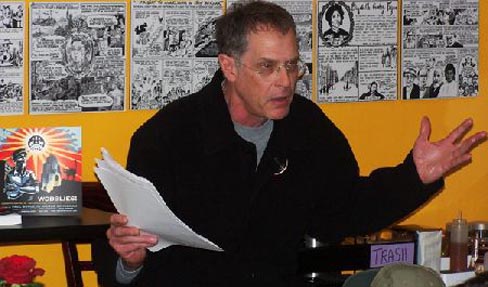The 1969 SDS convention in Chicago gave me a crushing headache, and I can’t have been the only one. Like most (but by no means all) the SDSers that I knew, I left the convention hall with the anti-PLers, sure that nothing could be quite worse than being dragged back, not just into 1930s rhetoric but to the least effective 1930s rhetoric, before the funny songs, successful labor mobilization, and great movies made the leftwing message somewhat diluted but a lot more popular.
The rude shock came soon. Mark Rudd, a fresh face and a good orator about to be elected, has recalled the disaster to follow as well as anyone, leaving out few criticisms of himself (something for which he deserves a lot of credit).
Radical youth organizations founded in the previous few years soon collapsed almost everywhere, irrespective of personalities and rhetoric. All of us could have done better, and none of us, in my view, deserves the Great Big Vindication. My old magazine, Radical America, made itself part of a diaspora from campus to blue-collar community, and if the magazine bravely held on and held up the ideals of SDS for another twenty years, we came up against a stone wall of history, too.
After all this time, a new SDS was launched, fittingly on Martin Luther King, Jr., day of 2006; and I watched membership applications roll in with enormous curiosity. To the question, “How did you hear of us?” the most common reply after “Friends” was something like “History,” either the reading of a book or the lecture of a teacher, high school or college. Some of the new members said, “My parents were members.” There are also those who joined after they saw the Weatherman film, including one of my current students, a Latina Wobbly and punk singer.
What did it mean? According to an essay in the summer issue of New Politics, it signified a monstrous return of Weatherism, a sign that the new organization, born in 2006, must be near the June 1969 moment of fatal implosion. This is a remarkable notion, given that 175 new SDS chapters have already been chartered, and more are being founded each week, often at the least likely of old SDS places: junior colleges and high schools, in the Old South (SSOC rather than SDS held this territory, back when), and among Latinos and Latinas.
So what is this all about? I call it the Listserv Lesson. SDS has grown with great speed, although we find no articles about it in the New York Times, or The Nation, for that matter. (Thanks, MRZine, NPR, Pacifica, and ZNet, among others, for fair and favorable mention.) Efforts to discuss what older folks should do have inevitably (as I now see it) prompted furious emailing from 1960s activists and other over-50s who don’t have a lot of political activity personally but do have a deep need to be heard by as many readers as possible. Nothing much needs to be accomplished but everything needs to be discussed. At length. Forever. If among the young, the whole history of SDS is to be discussed, among some of the old, the need for self-vindication trumps all. They have been waiting for a long time to be affirmed correct in their decisions of the late 1960s, and now, by gosh, they insist upon it. They are joined in their outrage by others who insist that SDS today is “extremist” and “anarchist,” dominated by young people who evidently need to be corrected.
None of this seems very serious, to me, at a time when the young SDSers are going ahead, heedless of assorted grandparently warnings. But there are things that oldtime activists can do, and some of MRZine readers may want to do. MDS, the old but still useful name for Movement for a Democratic Society, i.e., for those post-college, has been established first of all to provide logistical and legal assistance to SDSers. (In New York, MDS members are also very active in SDS demonstrations.) Our information is linked to nextleftnotes.net and can be easily accessed, but it may be useful to mention our Board’s members: they include veterans from across the American Left, Noam Chomsky, Charlene Mitchell, Bill Fletcher Jr., Carl Davidson, Tom Hayden, Al Haber (SDS’s founder), Michael James (of the Heartland Café), Gerald Horne, Mark Rudd, Jose Limon, Bernardine Dohrn, and E. Ethelbert Miller.
What I’m hoping is that MDS will begin to reach out to former SDSers, reconnect with other activists from the 1960s, begin to hold social and political events, fundraisers and other activities, especially in districts where a lot of 1960s activists have settled: the Bay Area, Portland, Madison, Austin, Boston and New York. We need to get together — and not just former SDS members, of course — for the good reason that so many of us are at or near retirement years, with more time to spend, as long as our energies hold out. SDS will have its now annual convention this coming summer, and it may be in Chicago, again, for the usual geographical reasons. SDS regions will be holding conferences in a half-dozen places over the winter, with report-backs of chapter doings, and looking ahead to all the issues of a constitution and so on. I hope oldtimers will be present . . . but not to condescend, to tell the new generation what to do, or to seek personal vindication on any grounds. That would be pointless, anyway.
Founder and publisher of Radical America, Paul Buhle was active in Champaign-Urbana, Storrs, and Madison SDS chapters, 1965-1969. He hasn’t been all that happy since, but he teaches at Brown. A founding member of the new Students for a Democratic Society (SDS), Buhle sees the struggle for Participatory Democracy as essential for peace and progress. For more about SDS today, visit www.studentsforademocraticsociety.org.
|
| Print

